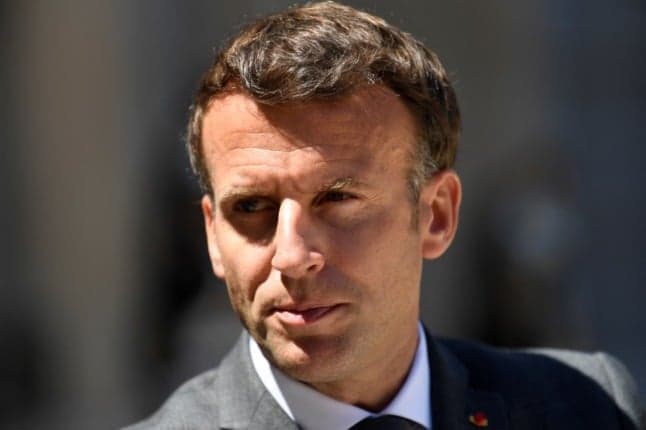Macron's 'grand tour' of France gets underway ahead of regional elections

French President Emmanuel Macron has begun a nationwide tour of France ahead of next year's presidential election.
The 43-year-old centrist, widely expected to seek a second term in polls next April and May, has begun what he calls the task of "measuring the country's pulse", on Wednesday visiting picturesque villages in southwest France.
Around a dozen stops are planned over the next two months, in a sign that the former investment banker has an eye on regional elections on June 20th and 27th, as well as his own personal political test next year.
ANALYSIS Can Macron cheer up the French with his 'Tour de France'?
Recent polls show him as the frontrunner in the presidential race, narrowly ahead of far-right candidate Marine Le Pen, while his personal ratings have improved as France reopens its bars, cafés, shops and restaurants.
His La République en Marche (LREM) party, which has struggled to build a presence outside of cities, is expected to perform poorly in the regional vote, however.
Macron has undertaken several other tours since his 2017 electoral triumph over the traditional parties of government on the left and right.
A 2018 trip to mark the centenary of the end of World War I is best remembered for the scenes of furious citizens booing and heckling France's youngest post-war leader.
It took place just as "yellow vest" protests were gathering momentum to denounce the government's policies and the head of state personally for his leadership style, which was criticised as aloof and arrogant.
Macron conducted another tour billed as a listening exercise in 2019 in the aftermath of those protests, which shook the country and saw him promise to change his way of governing.
Macron has spoken frequently about his fondness for spontaneous meetings with citizens, but extremely tight security due to threats from "yellow vests" and Islamic extremists have limited his opportunities in recent years.
An impromptu walkabout with his wife Brigitte through the Tuileries gardens in central Paris on Bastille Day last July ended with the head of state being verbally abused by a group of protesters.
The global Covid-19 pandemic has also restricted his travel and ability to focus on any political initiatives beyond short-term crisis management for the last 14 months.
Comments
See Also
The 43-year-old centrist, widely expected to seek a second term in polls next April and May, has begun what he calls the task of "measuring the country's pulse", on Wednesday visiting picturesque villages in southwest France.
Around a dozen stops are planned over the next two months, in a sign that the former investment banker has an eye on regional elections on June 20th and 27th, as well as his own personal political test next year.
ANALYSIS Can Macron cheer up the French with his 'Tour de France'?
Recent polls show him as the frontrunner in the presidential race, narrowly ahead of far-right candidate Marine Le Pen, while his personal ratings have improved as France reopens its bars, cafés, shops and restaurants.
His La République en Marche (LREM) party, which has struggled to build a presence outside of cities, is expected to perform poorly in the regional vote, however.
Macron has undertaken several other tours since his 2017 electoral triumph over the traditional parties of government on the left and right.
A 2018 trip to mark the centenary of the end of World War I is best remembered for the scenes of furious citizens booing and heckling France's youngest post-war leader.
It took place just as "yellow vest" protests were gathering momentum to denounce the government's policies and the head of state personally for his leadership style, which was criticised as aloof and arrogant.
Macron conducted another tour billed as a listening exercise in 2019 in the aftermath of those protests, which shook the country and saw him promise to change his way of governing.
Macron has spoken frequently about his fondness for spontaneous meetings with citizens, but extremely tight security due to threats from "yellow vests" and Islamic extremists have limited his opportunities in recent years.
An impromptu walkabout with his wife Brigitte through the Tuileries gardens in central Paris on Bastille Day last July ended with the head of state being verbally abused by a group of protesters.
The global Covid-19 pandemic has also restricted his travel and ability to focus on any political initiatives beyond short-term crisis management for the last 14 months.
Join the conversation in our comments section below. Share your own views and experience and if you have a question or suggestion for our journalists then email us at [email protected].
Please keep comments civil, constructive and on topic – and make sure to read our terms of use before getting involved.
Please log in here to leave a comment.